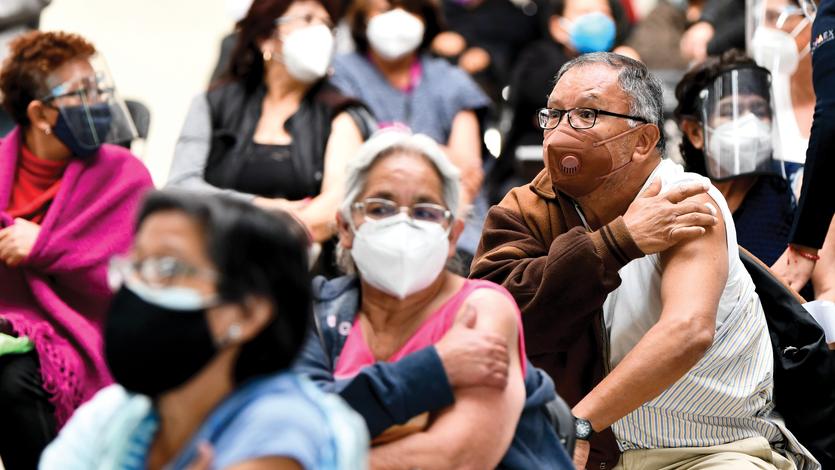Supplies prove vital after domestic plan struggles amid wait for US assistance
 Citizens inoculated with Sinovac COVID-19 vaccines sit in an observation area at a vaccination site in Ecatepec, Mexico, on Feb 20. (XIN YUEWEI / XINHUA)
Citizens inoculated with Sinovac COVID-19 vaccines sit in an observation area at a vaccination site in Ecatepec, Mexico, on Feb 20. (XIN YUEWEI / XINHUA)
Chinese vaccines are helping Mexico's COVID-19 vaccination campaign move forward after slowdowns caused by domestic manufacturing stumbles and foot-dragging from the United States on help for its southern neighbor.
Mexico has a deal to co-produce, along with Argentina, a vaccine from AstraZeneca for distribution in Latin America, and the country has also been working to develop a homemade vaccine. But progress has been slow, making it reliant on imported jabs for inoculating its population.
White House press secretary Jen Psaki said on March 1 that US President Joe Biden would not consider sharing the country's vaccine supply with Mexico, before softening its position
Compounding these problems was an earlier decision by the US to hold back exports from its vaccine stockpile to Mexico.
White House press secretary Jen Psaki said on March 1 that US President Joe Biden would not consider sharing the country's vaccine supply with Mexico, before softening its position.
Against this backdrop, Mexico is increasingly turning its focus toward Chinese and Russian vaccines.
READ MORE: Mexico's president 'expected to ask Biden to share US vaccines’
"The Mexican government trusted in (former US president) Donald Trump's help to ship vaccines out of the US. However, given the change of administration, help was denied and Mexico turned to China and Russia for vaccines," said Pedro Irigoyen, a regulatory affairs consultant in Mexico City.
For months, Mexico has been asking the US to send over supplies of the AstraZeneca vaccine. The US has stockpiled millions of doses, even though the US Food and Drug Administration is yet to approve the vaccine for use in the country.
On March 18, Mexico's Foreign Minister Marcelo Ebrard announced that the US had agreed to export 2.5 million doses, but the delivery schedule is uncertain.
This lack of clarity makes the Chinese and Russian vaccines all the more attractive in a nation hit hard by the coronavirus.
New chapter marked
The "solidarity between Mexico and China to cope with the healthcare emergency" helped this happen, Padilla said, adding that the vaccine cooperation marks a new chapter in the bilateral relationship.
Chinese vaccine manufacturers are already supplying the Latin American market. A partnership between CanSino and Drugmex, a Mexican pharmaceutical company, makes it possible for vaccines to be packaged at a plant in Mexico. Five million doses of CanSino's vaccine have already arrived in the country.
"Given the increase of information about the safety and efficacy of the Chinese vaccines and following the approval of Sinovac's and CanSino's vaccines by COFEPRIS, people have started accepting the Chinese jabs, just like the others," said Irigoyen.
On March 13, Mexico received its biggest shipment of vaccines from Sinovac.
"Today we receive the largest shipment of vaccines; a million doses of Sinovac. The vaccination plan accelerates the pace. Thanks Sinovac and the People's Republic of China!!," Ebrard tweeted.
CoronaVac is easier to store and transport than some of the other vaccines that have to be kept at subzero temperatures. With this advantage, Mexico plans to use the shots in harder to reach rural areas.
"Sinovac's and CanSino's vaccines are being used mainly in remote areas, given the fact that they don't require ultra-freezing conditions," Padilla said.
ALSO READ: Mexico's ruling party riven by rape claims against key candidate
Mexico, with 126 million people, has vaccinated more than 5 million. The country is also using Sputnik V from Russia, as well as a vaccine from Pfizer and BioNTech.
The country has more than 2.1 million confirmed cases of COVID-19, with over 197,000 deaths.
"In Mexico and in a great part of Latin America, Chinese jabs have been administered at a large scale," said Padilla. "They are being used in Chile and Peru, given to over 6,000 indigenous tribes in Brazil and achieving emergency approvals in Colombia, Uruguay and other countries."
The writer is a freelance journalist for China Daily.


